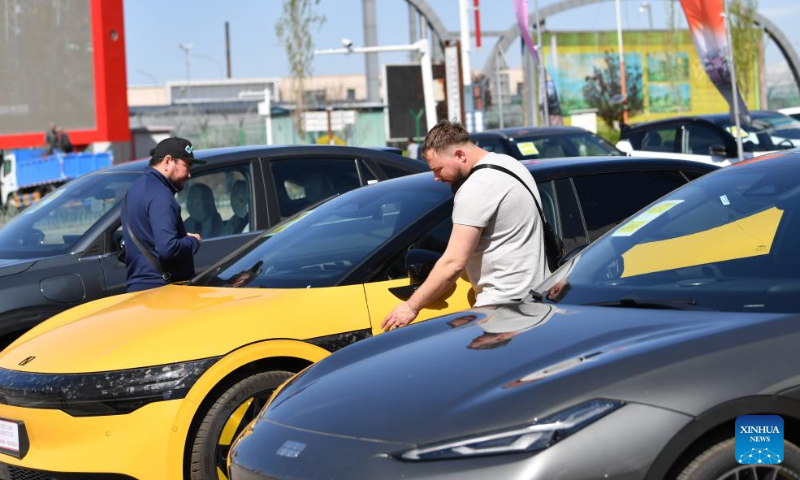
Foreign travelers view the cars on display at the Horgos International Border Cooperation Center on the China-Kazakhstan border in Horgos, northwest China's Xinjiang Uygur Autonomous Region, April 19, 2024. According to the statistics of the Horgos entry-exit border checkpoint, a total of over 1.34 million people have checked in and out of the center this year as of April 19. (Xinhua/Zhao Ge)
The so-called US "Uyghur Forced Labor Prevention Act" (UFLPA) does not prevent "forced labor," but creates "forced unemployment." The act does not protect human rights, but undermines the right to subsistence, employment and development of people in Xinjiang in the name of human rights, China's Ministry of Foreign Affairs spokesperson Wang Wenbin said on Tuesday, responding to a Congressional investigation on Monday claiming that global carmakers including BMW had shipped parts made by so-called forced labor into the US.
According to a report released by the US Senate Committee on Finance on Monday, some vehicles of BMW, Jaguar Land Rover and Volkswagen that were exported to the US had been found using components made by a Chinese supplier banned for using so-called forced labor in China's Xinjiang region.
Under the so-called UFLPA, the import of goods from Xinjiang to the US is banned unless companies can prove that production did not use "forced labor."
German carmaker BMW shipped at least 8,000 Mini Cooper cars containing banned components to the US, a move that violated the UFLPA, despite being notified, according to the report released on Monday.
In response to media questions for comment on Monday's report, Wang said at a regular press conference on Tuesday that the act might as well be called the most notorious and egregious law against human rights in the 21st century. This act not only imposes illegal sanctions on Chinese companies, but also forces companies around the world to join in the US attempt to contain and suppress China in the name of "compliance" and tries to create a coalition for economic coercion.
This is a deliberate US action to serve its selfish agenda at the expense of international economic and trade rules and industrial and supply chains. This is bullying and double standard at its worst. This is an attempt to reverse human development. China strongly condemns and opposes it, and will resolutely defend the lawful rights and interests of Chinese companies, Wang noted.
Chinese experts said that the intensified push by the US in probing global carmakers over "forced-labor" claims targeting China's Xinjiang Uygur Autonomous Region is groundless. They warned that the new move will cause further disruption to the world supply chain.
The US Congressional probe is another attempt to suppress Chinese industries that arises from political motives, under the guise of so-called forced labor, aiming to strangle normal economic development opportunities in China's Xinjiang, Cui Dongshu, secretary-general of the China Passenger Car Association, told the Global Times on Tuesday.
The automotive industry relies on supply chains in both China and around the world, benefiting from China's comprehensive industrial chain, which offers reliable and cost-effective products, the industry insider said, noting that "without utilizing components from China, companies like BMW and Jaguar Land Rover would struggle to maintain a competitive edge globally."
China is the world largest car exporter while the Xinjiang region is an important part of the domestic industry chain.
More than 15 percent of China's aluminum supply and about 9 percent of the global supply originates in Xinjiang, and the global automotive industry uses it for parts ranging from vehicle frames to wheels and battery foils, according to industry reports, the Associated Press reported.
Zhou Mi, a senior research fellow at the Chinese Academy of International Trade and Economic Cooperation, told the Global Times on Tuesday that the US' real intention is to curb Xinjiang's economic development and opportunities as well as those of China as a whole.
European automakers are facing increasing pressure to sever ties with the Xinjiang region amid heightened geopolitical tensions stirred up by the US.
In February, German carmaker Volkswagen came under pressure to pull out of a joint venture in Xinjiang, according to media reports.
Monday's move came amid
growing US protectionism targeting China's electric vehicle (EV) sector, which has become hysterical, with the Biden administration recently announcing the decision to hike tariffs on Chinese-made EVs to 100 percent over so-called overcapacity claims.
China's Ministry of Commerce has slammed the US move on tariffs, saying that it is a politicization and weaponization of trade issues and a typical case of political manipulation that will seriously affect the atmosphere for bilateral cooperation.
The US-led West wants to have a trade war with China on everything China produces that is competitive, because it simply can't compete with China's technological innovation. Because of that, the US wants to impose many new export bans, domestic subsidies, foreign investment regulations and tariffs, especially targeting China, Maya Majueran, director of the Belt & Road Initiative Sri Lanka (BRISL), a Sri Lankan-led organization, told the Global Times.
Monday's report released by the US Congress reflected the fact that despite the efforts of the US government to pursue economic coercion by pushing European automakers to decouple from the Chinese supply chain, businesses are still seeking cooperation with Chinese partners while minimizing risks in order to survive in the midst of adversity, Chinese experts said.
Despite the headwinds, BMW Group intends to increase investment in China, according to media reports.
During a three-day visit to China with German Chancellor Olaf Scholz in April, Oliver Zipse, Chairman of the Board of Management of BMW AG, told Chinese media that the company's development has benefited from free trade. It is even more necessary to strengthen international cooperation, promote unimpeded trade, promote growth, seek prosperity and expand employment, Zipse said, Yicai Global reported.




